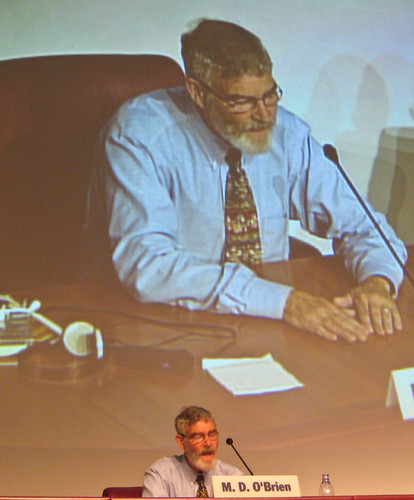I had to fight my way into the first conference at the Meeting 2008 at Rimini by name-dropping (Letizia Bardazzi, remember that!), so instead of standing at the back, I landed a second-row center seat! The hall was already filled with hundreds of people waiting to meet Michael O'Brien, the Canadian author of Father Elijah (which has been translated into eight languages) and some half-dozen more titles published by Ignatius Press.
The unassuming father of eight didn't come to speak about his books, however, but instead addressed the subject of fatherhood and particularly of God our Father, and of his silence which is total presence to us with an immense love.
O'Brien quoted from then Cardinal Ratzinger's address in Palermo in 2000 who offered an urgent message on fatherhood.
Human fatherhood gives us an anticipation of what God is. But when human fatherhood does not exist, when it is experienced only as a biological phenomenon without its human or spiritual dimensions, all statements about God the Father are empty. That is why the crisis of fatherhood we are living in today is an element, perhaps the most important, threatening man in his humanity.
Ratzinger then reflected on the name of God, because God is a Person and has a Name. In the Apocalypse, God's antagonist, the Anti-Christ, is a Beast. He has no name, but a number. In the concentration camps of World War II, faces and names were erased. People were transformed into numbers. This is the spirit of the anti-Christ, to make man a component of the meta-machine, to be reduced only to a function. The anti-Christ makes war on mankind.
In our days, Cardinal Ratzinger warned, we must not forget the monstrosities of history which occur when we adopt the same mentality. The world of the machine becomes normal. The machine imposes the same law as the concentration camp when men are interpreted by a computer, translated into numbers.
God our Father has a name. He calls each of us by name. He is a person who looks at us and sees another person. The true story of man is that we are sons and daughters, and we can never be things. To be a thing is the working definition of materialism, of a soft totalitarianism.
This is homo-sino-deo, man without God, autonomous man. Some have never known a Father, are orphaned, or think they never had a Father. The problem is multidimensional: social, psychological, spiritual.
O'Brien went on to relate three personal stories from his experience as a father which I won't transcribe because too much would be lost without his own delivery. The impression left was of a strong man of faith who encouraged us to trust in God's paternal love for each of us and to accept the sacrifice united to the cross that love needs to expand the heart.

No comments:
Post a Comment